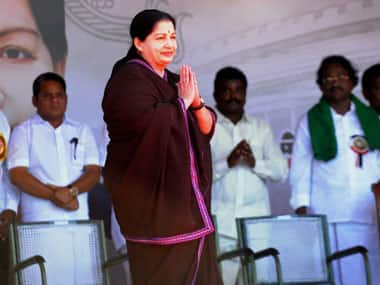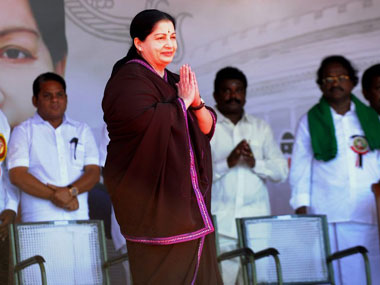As 2014 draws to a close, the lasting images from Tamil Nadu are that of the Jayalalithaa — the stately chief minister who singlehandedly captured 37 out of the 39 seats in the Parliament elections and then, a few months later, bowed out of office because she was no longer qualified to sit there. Nobody knows what’s in store for her and her party in 2015. Will she get her conviction overturned? Will there be a long drawn out legal struggle that will keep her out of office for a few years to come? And will it affect the party’s prospects in the 2016 assembly elections? [caption id=“attachment_2024805” align=“alignleft” width=“380”]
 J Jayalalithaa. AFP[/caption] She had to leave the office of the chief minister at a time when, riding high on a slew of pro-poor welfare measures, she didn’t have any governance challenges. There is still a government in place and a chief minister, who so far hasn’t betrayed major lacunae because of her absence. But, how long can this last, will he able to run on the fuel that’s mainly Jayalalithaa’s image are questions that will need to be answered in 2015. 2014 was also a year when BJP tasted some success in Tamil Nadu. After the AIADMK mopped up 37 seats, its alliance won the only two seats left. One went to the party itself while the other to its partner, PMK. What was equally impressive was the vote-share the front (BJP-DMDK-PMK-MDMK) garnered — 18.5 percent. That the DMK-led alliance could gain only eight percent more votes than the BJP-front showed the inroads the combine had made into the Dravidian heartland. Has it been a success of the BJP or the alliance partners? Nobody knows, but certainly the DMDK and the PMK are influential parties with reasonable, still single-digit, vote-shares. The allies together, including MDMK, polled 13 percent votes leaving the BJP with only 5.5 percent votes. In comparison, there were no bright spots for the DMK in 2014 and the party is yet to recover from its slump. Its biggest problem in the Lok Sabha elections was it had no useful ally. That almost the entire vote-share of its front in the elections came on its own strength (23.6 per centout of 26.8 percent) speaks for the helplessness that the party was in. In addition, the fratricidal strife in the party also appeared to have weakened its image and prospects. What does 2015 hold for the DMK? The party is in complete control of Stalin and his focus is to re-strengthen it bottom up. Will he able to get back the mojo? If he has to take on the AIADMK, which fought and garnered a formidable 44.3 percent of the votes in the Lok Sabha elections, he will certainly need more allies that can contribute useful numbers. While the DMK is yet to regain its past lustre and the AIADMK appears to have slightly lost because of the setback to its leader, the BJP is hoping to aim big. The party president Amit Shah has rolled out a path to build the party from the grassroots and has energised its cadres and local leaders, but what’s still missing is impact. The party hasn’t been able to get a single new face of consequence and it still doesn’t have a popular leader who can spearhead the campaign for the 2016 assembly polls. Although the BJP publicly harbours ambitions for its own chief minister, it’s either simple posturing or wishful thinking. It also remains to be seen if it will be able to lead an alliance because both the DMDK and the PMK want leadership roles. Although the DMDK hasn’t spelt out its alliance plans, it has said that Vijayakanth should be projected as the leader. For him, 2016 elections will be crucial because he will like to show the AIADMK, his alliance partner in the last assembly elections, that he is a potent force. The BJP joining hands with the AIADMK cannot be ruled out. In Amit Shah’s latest outing in the state, he was unsparing on the DMK, but kept quiet on the ruling party. In such a case, the DMK will be able to get the other allies on its side, which in fact will offer the best prospects. The main aim of all the parties in 2015 will be to prepare the ground for the assembly elections. More than any other party, it will be most crucial for the AIADMK because of the incumbency factor. It will have to deliver more because a lot can change in the last year of government. And the party will need Jayalalithaa to lead them yet again. It remains to be seen if the legal burden will slow them down.
J Jayalalithaa. AFP[/caption] She had to leave the office of the chief minister at a time when, riding high on a slew of pro-poor welfare measures, she didn’t have any governance challenges. There is still a government in place and a chief minister, who so far hasn’t betrayed major lacunae because of her absence. But, how long can this last, will he able to run on the fuel that’s mainly Jayalalithaa’s image are questions that will need to be answered in 2015. 2014 was also a year when BJP tasted some success in Tamil Nadu. After the AIADMK mopped up 37 seats, its alliance won the only two seats left. One went to the party itself while the other to its partner, PMK. What was equally impressive was the vote-share the front (BJP-DMDK-PMK-MDMK) garnered — 18.5 percent. That the DMK-led alliance could gain only eight percent more votes than the BJP-front showed the inroads the combine had made into the Dravidian heartland. Has it been a success of the BJP or the alliance partners? Nobody knows, but certainly the DMDK and the PMK are influential parties with reasonable, still single-digit, vote-shares. The allies together, including MDMK, polled 13 percent votes leaving the BJP with only 5.5 percent votes. In comparison, there were no bright spots for the DMK in 2014 and the party is yet to recover from its slump. Its biggest problem in the Lok Sabha elections was it had no useful ally. That almost the entire vote-share of its front in the elections came on its own strength (23.6 per centout of 26.8 percent) speaks for the helplessness that the party was in. In addition, the fratricidal strife in the party also appeared to have weakened its image and prospects. What does 2015 hold for the DMK? The party is in complete control of Stalin and his focus is to re-strengthen it bottom up. Will he able to get back the mojo? If he has to take on the AIADMK, which fought and garnered a formidable 44.3 percent of the votes in the Lok Sabha elections, he will certainly need more allies that can contribute useful numbers. While the DMK is yet to regain its past lustre and the AIADMK appears to have slightly lost because of the setback to its leader, the BJP is hoping to aim big. The party president Amit Shah has rolled out a path to build the party from the grassroots and has energised its cadres and local leaders, but what’s still missing is impact. The party hasn’t been able to get a single new face of consequence and it still doesn’t have a popular leader who can spearhead the campaign for the 2016 assembly polls. Although the BJP publicly harbours ambitions for its own chief minister, it’s either simple posturing or wishful thinking. It also remains to be seen if it will be able to lead an alliance because both the DMDK and the PMK want leadership roles. Although the DMDK hasn’t spelt out its alliance plans, it has said that Vijayakanth should be projected as the leader. For him, 2016 elections will be crucial because he will like to show the AIADMK, his alliance partner in the last assembly elections, that he is a potent force. The BJP joining hands with the AIADMK cannot be ruled out. In Amit Shah’s latest outing in the state, he was unsparing on the DMK, but kept quiet on the ruling party. In such a case, the DMK will be able to get the other allies on its side, which in fact will offer the best prospects. The main aim of all the parties in 2015 will be to prepare the ground for the assembly elections. More than any other party, it will be most crucial for the AIADMK because of the incumbency factor. It will have to deliver more because a lot can change in the last year of government. And the party will need Jayalalithaa to lead them yet again. It remains to be seen if the legal burden will slow them down.
2015 will be crucial for Jayalalithaa, but will legal burden slow her down?
G Pramod Kumar
• December 31, 2014, 17:50:12 IST
AIADMK will have to deliver more because a lot can change in the last year of government. And the party will need Jayalalithaa to lead them yet again. It remains to be seen if the legal burden will slow them down.
Advertisement
)
End of Article